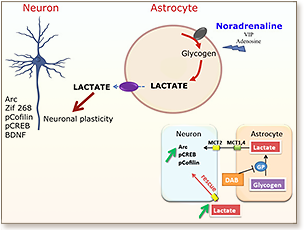 Conditioned responses to drug-associated cues that can persist for up to years after abstinence represent a core symptom of addiction and most likely the main vulnerability of many, if not all, addicts. Converging evidence collected over the past decades has revealed that memory and addiction share both neural circuitry and molecular mechanisms, providing a strong rationale for empirical observations indicating that, through predictive association with the drug’s effects, drug-conditioned stimuli can precipitate the reinstatement of previously extinguished drug-seeking behaviors. In other words, both clinical and laboratory observations have converged onto the hypothesis that addiction represents the pathologic hijacking of neural processes that normally account for reward-related learning. In this context, persistence of drug addiction would depend on the remodeling of synapses and circuits that shape long-term associative memories. Hence, survival necessitates constant adaptation of the behavioral repertoire, whereby learning the significance of a predictive cue serves to select the most appropriate response, whereas drug addiction triggers neuroplastic changes that ultimately restrain decision-making processes and free will. In particular, drug cues evoke salient, persistent, and overwhelming memories of drug-taking experiences, leading to overpowering motivational strength and decreased capacity to control the desire to consume drugs. Despite years of research and numerous scientific reports, several questions remain to be answered concerning the mechanisms by which long-term memories for drug-paired cues resist extinction and contribute to the enhanced drive to take drugs...
Conditioned responses to drug-associated cues that can persist for up to years after abstinence represent a core symptom of addiction and most likely the main vulnerability of many, if not all, addicts. Converging evidence collected over the past decades has revealed that memory and addiction share both neural circuitry and molecular mechanisms, providing a strong rationale for empirical observations indicating that, through predictive association with the drug’s effects, drug-conditioned stimuli can precipitate the reinstatement of previously extinguished drug-seeking behaviors. In other words, both clinical and laboratory observations have converged onto the hypothesis that addiction represents the pathologic hijacking of neural processes that normally account for reward-related learning. In this context, persistence of drug addiction would depend on the remodeling of synapses and circuits that shape long-term associative memories. Hence, survival necessitates constant adaptation of the behavioral repertoire, whereby learning the significance of a predictive cue serves to select the most appropriate response, whereas drug addiction triggers neuroplastic changes that ultimately restrain decision-making processes and free will. In particular, drug cues evoke salient, persistent, and overwhelming memories of drug-taking experiences, leading to overpowering motivational strength and decreased capacity to control the desire to consume drugs. Despite years of research and numerous scientific reports, several questions remain to be answered concerning the mechanisms by which long-term memories for drug-paired cues resist extinction and contribute to the enhanced drive to take drugs...